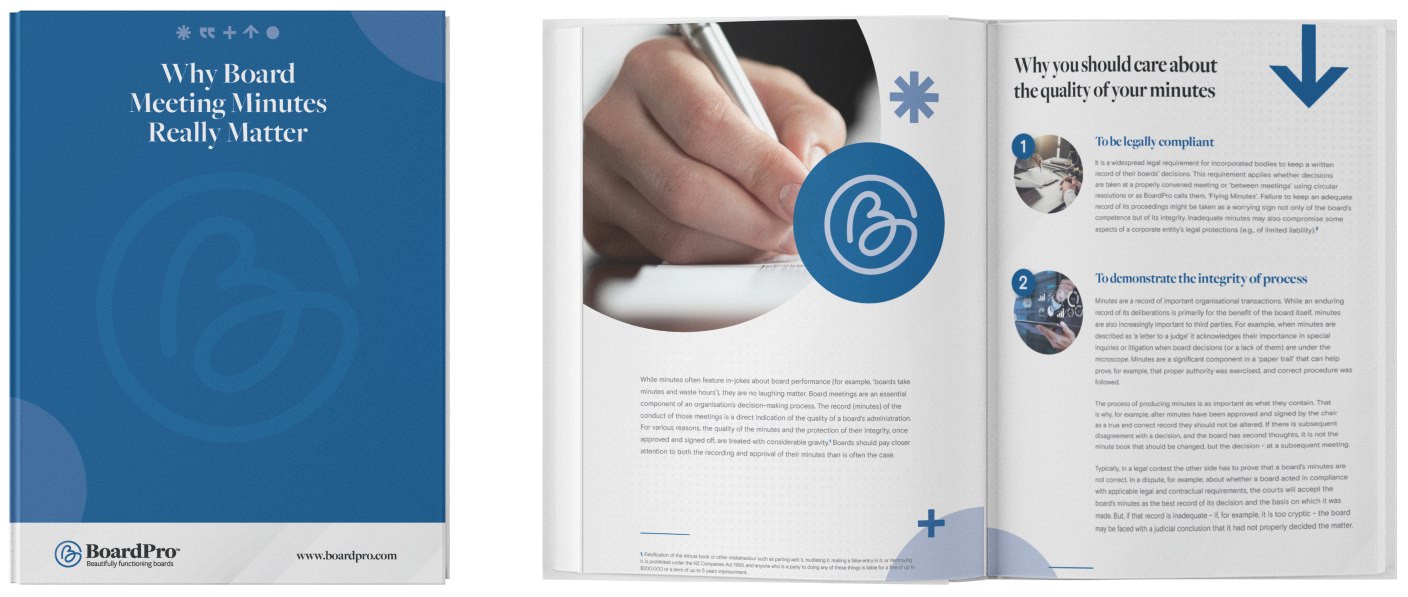Board meeting minutes are far more than just a formal requirement; they are a building block of effective board management and a testament to organisational transparency and accountability.
In this article, we explore the top eight frequently asked questions about meeting minutes.
1. What are board meeting minutes?
Board meeting minutes are more than a general account of board discussions; they serve as an official and legal record of the meeting of the Board of Directors. Minutes are used in a variety of ways including tracking progress, detailing future plans, and serving as a reference point.
Save time and budget by using board management software for your minutes
2. Why do we need board minutes?
Board minutes are required for both legal and practical reasons.
For example, in New Zealand, every organisation (company and not-for-profit) is required to take minutes of all proceedings of its directors, which must then be retained for seven years from the date of the meeting. Other countries have their own requirements. Aside from the legal requirement to do so, there are good practical reasons for having board minutes including:
- having a record of decisions – useful as a reminder to attendees, to brief any director who couldn’t attend the meeting, and for long-term internal record purposes;
- showing that the directors acted professionally, in accordance with their duties – especially if the decision might be called into question in the future.
3. Are board meeting minutes confidential?
Yes. The board should assume the minutes are confidential and, in most cases, they will remain so. They should also realise that, sooner or later, the minutes may be available as part of a legal case. In short, they should include everything necessary to show that the directors are doing their duty.
4. Do minutes need to be signed?
The organisation's secretary typically takes meeting minutes. In some cases and in smaller companies, the CEO will find themselves charged with taking the minutes. In New Zealand the Companies Act requires that the board confirm meeting minutes. There is no direct stipulation for the minutes to be physically or digitally signed. Other countries have their own requirements, so seek advice as to the right course of action in your jurisdiction.
5. What should the board minutes include?
Although there is no set format for board minutes, the following should be included as a minimum:
- The registered name of the company
- The date, time and place of the meeting
- The names of the directors (and any others) that attended and details of any who sent apologies
- The name of the person acting as chairperson (if any)
- Confirmation that notice of the meeting has been given and a quorum is in attendance
- Declarations of the directors’ interests in the matters being discussed, where required
- Approval of minutes of previous meeting
- A short narrative recording the matters discussed or approved and decisions taken at the meeting. If a resolution was passed, the minutes should record the exact wording of that resolution
- A note of any instructions to the company’s officers e.g. to make any filings with the company office or any other regulatory authority, or changes to the company’s statutory books and registers
6. Who signs the board minutes?
If required in your jurisdiction, the board minutes can be signed by any of the directors, but are most commonly signed by the board chairperson. Subject to any specific requirements in a company’s articles of association, board minutes can be kept in (a) hard copy or (b) electronic form so long as the paper copy can be produced.

7. Are not-for-profit minutes public information?
There is no general requirement that board minutes be public – though some countries have laws that they must be available to members. However, not-for-profit organisations earn trust by being open about how they handle the public trust that has been granted to them.
8. Can anyone show up at a not-for-profit board meeting?
Unless the laws or bylaws indicate differently, not-for-profit board meetings are usually closed. In fact, not-for-profit boards tend to operate like their company counterparts with respect to their meetings in general. While certain situations suggest that not-for-profit boards should seek outside, third-party expertise, they often don’t pursue it.
Organisational bylaws usually indicate whether board meetings are open or closed, and whether they can share board meeting minutes with their members or members of the public. If this issue isn’t clear in the existing bylaws, boards should put it on their agenda for discussion. Some funders may require open meetings, so they can gain assurance that their donations are being used for their specified purpose. This is a tender issue for some not-for-profit board members who believe that whatever goes on in the boardroom, should stay in the boardroom.
Board meeting minutes are more than mere records; they are a testament to an organisation's integrity and commitment to proper governance. Understanding their significance, composition, and the legalities surrounding them is crucial for anyone involved in corporate or non-profit board management.
NOTE: The information in this article is not legal advice. We strongly suggest you take advice in your jurisdiction to ensure your organisation is compliant when it comes to board meeting minutes.
Where to next?
- Learn the 7 key factors that will make your minutes a success
- Browse webinars to learn more about how to make governance easy
- Download the free white paper ...
Download the guide and minutes template
Share this
You May Also Like
These Related Stories

How to create quality meeting minutes

The BoardPro community's take on creating effective minutes




